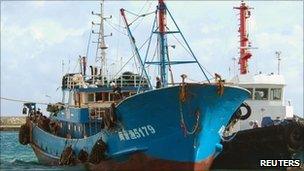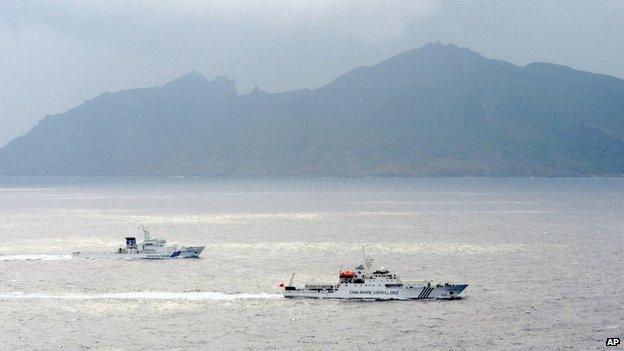Lingering fall-out from China-Japan territory row
- Published
Japan has decided to return the captain of a Chinese fishing boat whose detention in disputed waters earlier this month caused the biggest row between the two countries for several years. BBC defence and security correspondent Nick Childs looks at the effect of the row, which centres on a chain of uninhabited islands which Japan controls but which are also claimed by China and Taiwan.

The Chinese trawler was seized after colliding with Japanese patrol boats near islands both claim
The decision to release the Chinese fishing boat captain may take the immediate sting out of relations.
But the diplomatic fallout from the row is likely to linger, as people assess who has won and who has lost out on this.
Beyond that, the hardline behaviour of both sides in the dispute up to now has underlined that the diplomatic atmosphere is changing in the region, as China's neighbours adjust to what is evidently a greater regional and international assertiveness by Beijing - even though China insists there is nothing to fear.
Beyond the China-Japan frictions, there has been renewed focus on the territorial disputes in the South China Sea. That has attracted Washington's attention, much to Beijing's annoyance.
And then there are the seemingly increasing uncertainties on the Korean peninsula.
There may be lessons for all concerned. These developments are confronting China's leadership with a difficult set of domestic and international pressures.
For its neighbours, and the United States, recent events have sharpened questions about who in Beijing is really running things in terms of foreign policy.
And it is not all about Chinese assertiveness. Whatever is behind the sudden change of tune in Tokyo, where does Japan see itself in this fluid mix?
From Washington, there seems to have been a deliberate decision to re-engage in and refocus on the region.
So far events seem to be pushing many of Beijing's neighbours to shore up their ties with Washington - something that will be underlined when President Barack Obama meets South East Asian leaders in New York shortly.
- Published8 September 2010
- Published21 September 2010
- Published10 November 2014
